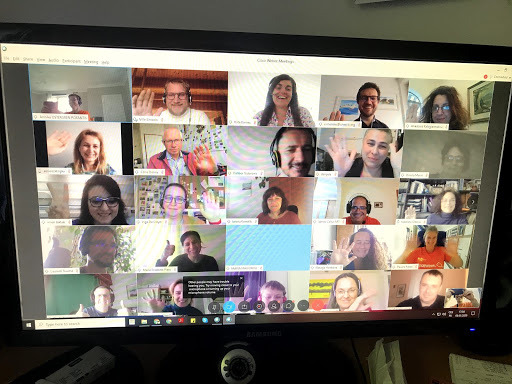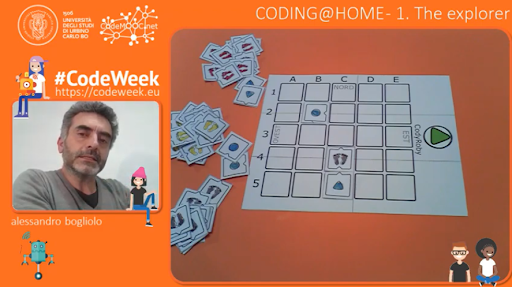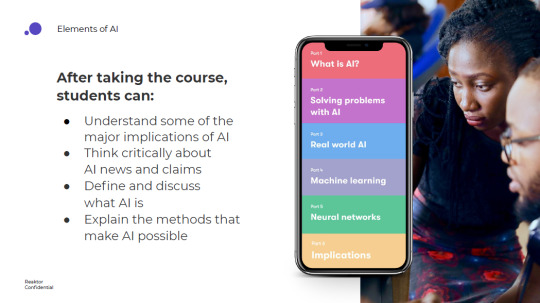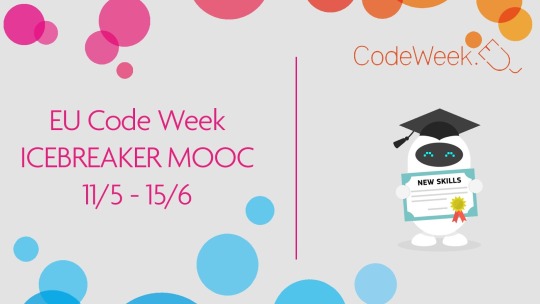Coding from Home 5
Publication date: May 7, 2020
A look at Unesco’s work to support teachers, AI resources and gave a sneak preview of the Coding@Home tutorials
During the 5th Coding from Home, webinar participants got a preview of the Coding@Home tutorials that will be released at the end of the week. They also learned about the free massive online course Elements of AI and about Microsoft’s resources targeting girls wanting to learn more about artificial intelligence (AI). Moreover, Valtencir Mendes presented Unesco’s response to the Covid-19 pandemic for education. The recording of the webinar is on Youtube.

Alessandro Bogliolo, Professor of Information Processing Systems at the University of Urbino, Italian EU Code Week ambassador and coordinator of all ambassadors, presented the Coding@Home series. It is a collection of 10-15 min videos, do-it-yourself materials, puzzles, games, and coding challenges that can be used at home or in school.
The activities are unplugged and participants do not need any previous knowledge of coding. Kids can play games with their families or online with their teachers.
The purpose of the Coding@Home activities is to stimulate computational thinking and cover basic principles such as instructions, conditional statements, loops, cryptography, pixel art, drawings, etc., but the main principle is playfulness.

The series is published on the EU Code Week website and will be translated into all the website’s languages. More than 20 videos are in the pipeline, with three being released this week. It builds on Alessandro’s “Coding in Famiglia” initiative, which is available on Rai Cultura.
Valtencir M. Mendes, Project Officer in the Global Education Coalition team at Unesco, presented Unesco´s Covid-19 response. An unprecedented 1.3 billion students across the world have been impacted by schools closing down, affecting the most vulnerable groups the hardest. Their platform includes links to national platforms, distance learning solutions, webinars to support teachers on topics such as ensuring equity in all learning solutions, exams and assessments etc. Valtencir invited the EU Code Week community to share their experience and “Tell your story”.

Unesco is also looking at good practices for girls who want to learn coding and STEM and what influences them to study these subjects. Valtencir’s full presentation is available on Slideshare.
Next, Kate Barnes Microsoft, Manager Strategic Partnerships, Philanthropies at Microsoft, introduced the Alice envisions the future a resource page with classes, tutorials, practical examples such as how to build a chatbot. It targets 12-18-year-old girls interested in learning artificial intelligence (AI). No prior knowledge of coding is needed to take part.
Ville Sinisalo, Reaktor, spoke about Elements of AI, a free online 25-hour course on the basics of artificial intelligence. The course has five modules that cover what AI is – and is not; Solving problems with AI, Real-world and AI, Machine learning and Neural networks. After the course participants are expected to understand the basics of AI, think
critically about AI news and be able to discuss and have a founded opinion about artificial intelligence.

The course is open to anyone with a curious mind. No programming skills are needed. Since May 2018, 420,000 students between 16 and 82 years of age have registered in 170 countries. The goal to reach 1% of the Finnish population has already been reached and now the target is to reach 1% of Europe’s population. To this end, the European Commission has translated the course into all EU languages. Elements of AI is currently available in English, Estonian, Finnish, German, Norwegian and Swedish, with more languages coming soon. A second more in-depth course is being prepared, which will be published later this year.
Finally, Annika Östergren Pofantis, EU code Week coordinator, encouraged participants to spread the word about the 5-hour introductory “Icebreaker” online course that
will start on Monday 11 May. It targets teachers and other activity organisers with a curious mind who want to learn some basics about computational thinking and coding, get practical tips on how to set up engaging activities and to take part in Code Week.



